Feb 27, 2025 – Day 11 of the 100-Day Dharma Talk, 6th Open Dharma Assembly
Hello. Today is the 11th day of Venerable Pomnyun Sunim’s 100-Day Dharma Talk.
Sunim began his day by participating in an online board meeting for JTS USA at 7:30 AM, after completing his morning practice and meditation. The meeting included reviewing the 2024 business report and financial statements, as well as deliberating and approving the 2025 business plan and budget.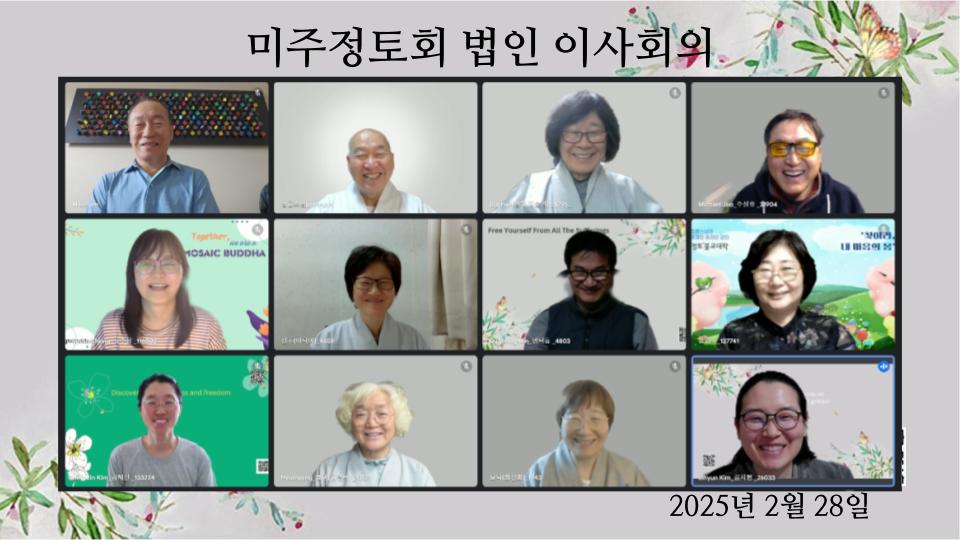
Afterward, Sunim headed to the Jungto Social and Cultural Center to deliver his 100-Day Dharma Talk. At 10:15 AM, the Open Dharma Assembly began with the recitation of the Three Refuges and the Heart Sutra.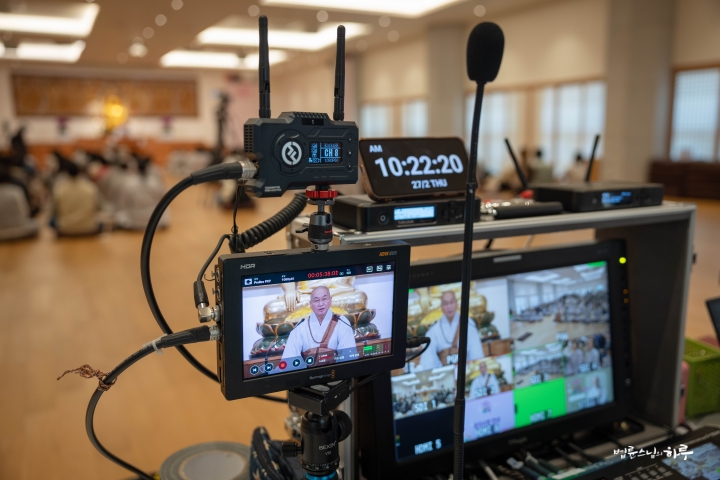
With about 130 people in attendance, the assembly formally requested Sunim’s Dharma talk with three bows. Continuing from the previous session, Sunim spoke on the “1000-Day Practice” that Jungto Society members perform for one hour each morning. He explained in detail the meaning of various aspects such as “Goals of the 1000-Day Practice,” “Attitude of a Practitioner,” “Four Great Vows,” “Giving,” and “Service.”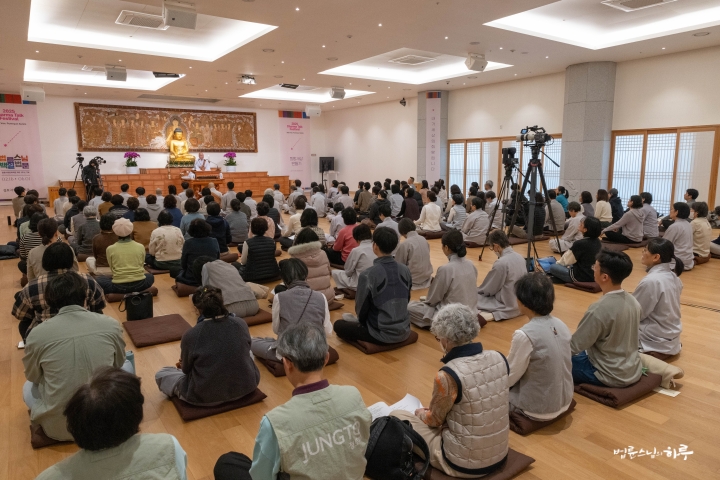
“Practice means taking refuge in the Three Jewels—Buddha, Dharma, and Sangha—and cultivating the threefold training of precept, meditation, and wisdom. The 1000-Day Practice method in Jungto Society consists of three components: first, repentance, which is a commitment to purely observe the precepts; second, meditation to cultivate concentration; and third, sutra recitation to attain wisdom by internalizing the Buddha’s teachings. This corresponds to seeking enlightenment for oneself. In Mahayana Buddhism, we must also establish a vow to liberate all sentient beings. The content of this vow is the ‘Vow of a Jungto Practitioner.’ The ‘Goals of the 1000-Day Practice’ outline how to realize this vow in our daily lives during these thousand days. Jungto practitioners should always keep these in mind during their practice. There are ten goals in total for the 1000-Day Practice.”
First, Become a Person Free from Suffering Who Is Well-Used for the Benefit of Neighbors and the World
This means we should not lose sight of the perspective of practice. Jungto Society is an organization of practitioners. In all activities within Jungto Society, maintaining the perspective of practice should be the top priority. Whether engaging in humanitarian aid or peace movements, these activities are not conducted by ordinary people but by practitioners. For example, if a Jungto practitioner engages in politics, it is a practitioner doing politics. While others might pursue politics for personal gain, a practitioner in politics must work for the benefit of the people without seeking personal profit. 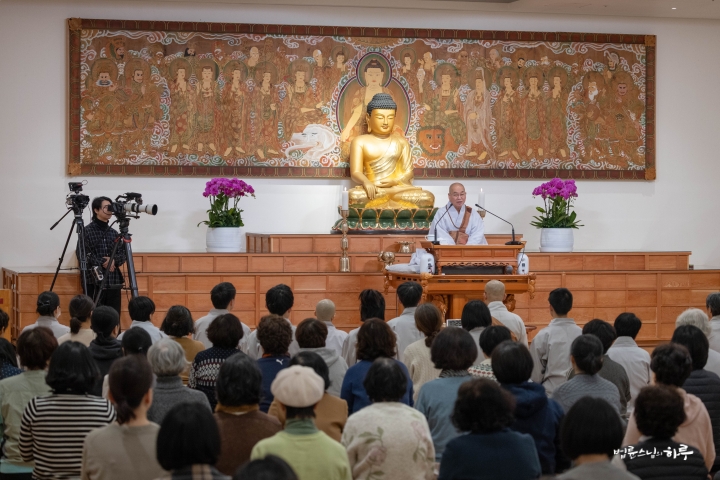
Why Jungto Society Doesn’t Hire Employees
Practitioners are independent beings. In human relationships, everyone is equal. The relationship between you and me is equal, though our roles may differ. Relationships among practitioners are not hierarchical. Therefore, practitioners should neither employ others nor be employed. During the Buddha’s time, there was discrimination based on caste and gender. However, the Buddha did not tolerate any discrimination within the Sangha, the community of practitioners. Outside these doors, you may employ others or be employed, but within this Dharma, there should be no employment relationships. Within Jungto Society, everyone must be equal as practitioners. If a married couple comes to Jungto Society, one should not serve or attend to the other as a spouse within this space. Such behavior would prevent one of them from being an independent practitioner. This is why Jungto Society does not hire employees.
Suppose I hired a driver. From the driver’s perspective, would they see me as a Sunim or as an employer? They would see me as an employer related to their livelihood. If this person felt their work conditions were unfair, they could file a labor dispute. It’s their legal right. They could raise issues from working hours to minor human rights concerns. If a practitioner were sued over employment issues, how would that align with the Buddha’s teachings? That’s why such relationships should not be formed in the first place. Jungto Society operates solely through volunteers for this very reason, not simply to save money. A volunteer system is extremely inefficient compared to hiring employees. Nevertheless, Jungto Society maintains this principle of being a community of practitioners by operating exclusively through volunteers. 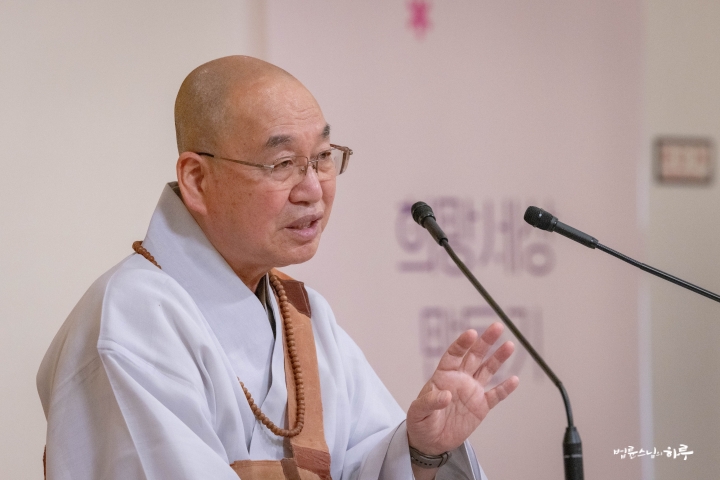
During the Goryeo and Silla dynasties, the class system that existed in society was also accepted within Buddhism. At that time, kings would grant land and labor to temples. They provided slaves. These people were called “Sano” (temple slaves). In temples, these slaves cooked meals, farmed, and cleaned. Monks practiced on this foundation. Strictly speaking, the monks of that era cannot be considered true practitioners. Instead, they could be called religious leaders or scholars because religious leaders and scholars do not deny the social system itself. This is similar to when Buddha was a prince and lived with several servants: servants who drove horses, prepared his bed, made food, changed his clothes, and so on. However, after Buddha renounced the world, he never kept a servant until he entered nirvana. Instead, practitioners shared roles, with Ananda serving him. This was a voluntary relationship, not a forced master-servant relationship. Thus, there are many differences between Buddha’s life as a practitioner and the lives of historically famous high monks. When gender and class discrimination were prevalent in society, Buddha transcended these limitations and created a practice community that maintained equality. However, most renowned high monks in history lived within the systems of their time. In communist regimes, they adapted to communism; in dynastic eras, they adapted to dynastic systems. Buddha, though living in a dynastic era, did not enter the royal palace. He received meals but did not frequent the palace.
That’s why Jungto Society, following Buddha’s fundamental teachings, maintains a system operated by volunteers without hiring employees, to uphold our principle as practitioners. However, I’m not sure how long Jungto Society will be able to maintain this principle. I think it can be maintained until I die, but it might be difficult afterward. This is because of efficiency. When efficiency becomes the priority, it becomes difficult to maintain principles. That’s why I say if something cannot be done while maintaining the principles of practice, we shouldn’t do it. For example, if we cannot operate the Jungto Social and Cultural Center building while maintaining our principles, we shouldn’t have such a building. We could live in huts instead; there’s no need to build large structures if it means violating our principles. Therefore, everyone who comes here must do their own work. Whether it’s cleaning, preparing meals, or providing guidance, there is not a single employed staff member here.
The first goal of the 1000-Day Practice is equal in importance to the other nine goals. The remaining nine goals all relate to social practice.” 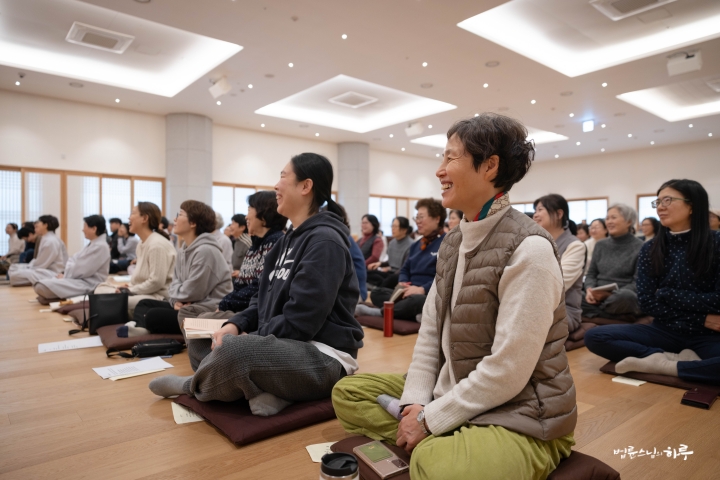
Continuing, Sunim explained the meaning of each of the ten goals of the 1000-Day Practice.
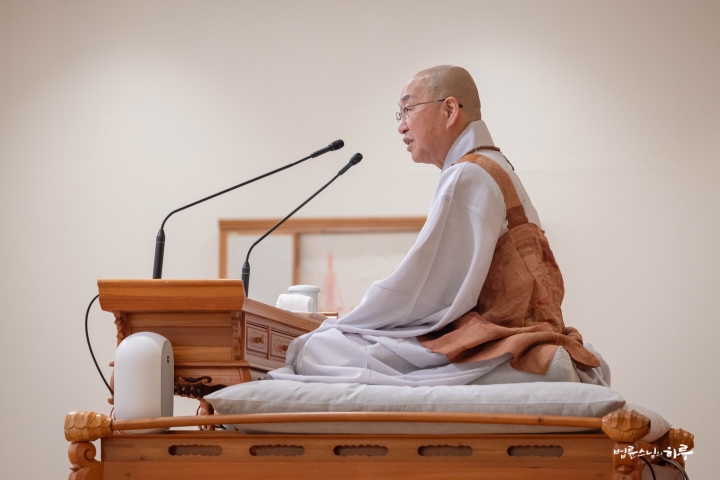
Seventh, Spread a Lifestyle of Using Less to Overcome the Climate Crisis.
“This goal addresses the most fundamental cause of the climate crisis: reducing activities that consume large amounts of energy. Using a lot of energy doesn’t just mean using a lot of electricity or driving cars frequently. Every item we use requires energy to produce, and this process releases carbon dioxide. Since this is the main culprit behind the climate crisis, Jungto Society aims to promote a frugal lifestyle. We primarily focus on the ‘Stop Consumption’ movement—essentially, a movement to stop buying things.
I practice this ‘Stop Consumption’ movement myself, though it sometimes creates a bit of conflict with the person who assists me. My current kasaya is quite worn and often needs mending. When this happens, the person beside me says:
‘Sunim, it takes more effort to mend this robe than to buy a new one.’
That might be true. We would need to calculate the energy costs first. Of course, in terms of labor, mending clothes is less efficient. But this issue can’t be measured by labor alone. How many people will wear this type of kasaya in the future? Probably none, since fewer people are becoming monks these days. So I think I can just wear this robe until I die. If there were someone to wear it after me, I could pass it on to a disciple, but right now, there’s no one. So my plan is to keep mending it until I die, and that will be the end of it. This is what Jungto Society’s ‘Stop Consumption’ movement is about—trying to live by using what we already have whenever possible. 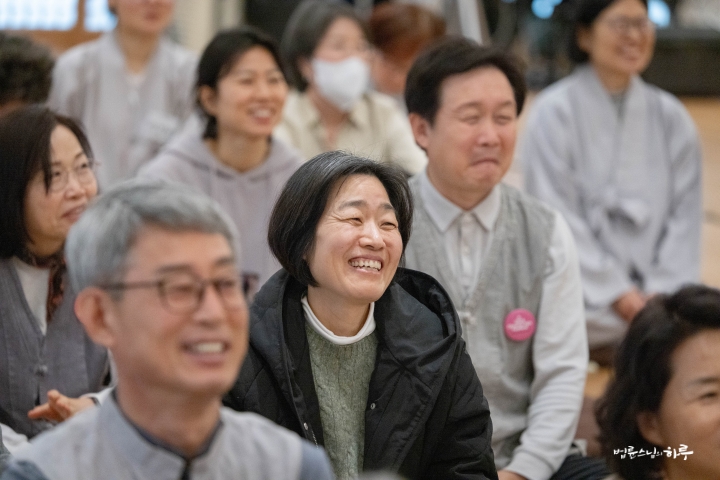
Eighth, Expand Domestic and International Activities to Eliminate Hunger, Disease, and Illiteracy.
This means sharing. When we look at the global picture, our prosperity indicates that resources are somewhat concentrated in our favor. Hunger refers to starvation, disease refers to situations where people cannot receive treatment despite being ill, and illiteracy means children cannot even attend elementary school. It might seem unimaginable that children cannot attend elementary school, but globally, many children face this reality. After the Syrian civil war began, approximately 3.5 million refugees crowded into refugee camps in northern Syria. Children there have had no access to schools for ten years, numbering between 500,000 and 800,000. To eliminate illiteracy, people need to know how to read, write, and do basic arithmetic. Perhaps arithmetic is even more important than reading and writing because knowing how to calculate is essential for conducting business or any kind of transaction.
Jungto Society has been focusing heavily on this eighth item. Last year, we built a new school in the earthquake-affected area of Syria that can accommodate 4,000 students. We constructed an excellent school building at a relatively low cost, making it the best school in that community. Recently, Syrian rebels quickly overthrew Assad’s dictatorial regime and took power. As a result, JTS is now cooperating with the new Syrian government. Since South Korea and Syria do not yet have diplomatic relations, a director from our Ministry of Foreign Affairs recently visited Syria to establish diplomatic ties. The Syrian Foreign Minister expressed gratitude for the significant help provided by Korean NGOs, highlighting the substantial contribution of JTS’s activities. 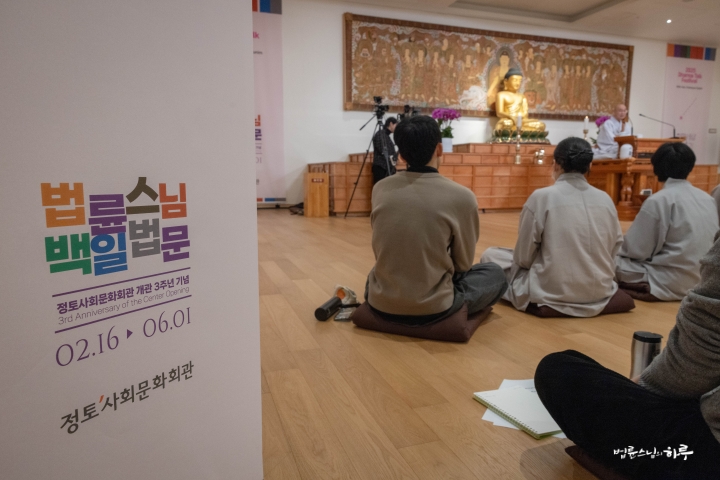
In Mindanao, Philippines, we are building ten schools each year for children with disabilities and indigenous communities. We are also providing aid to flood-affected areas in Pakistan and have distributed 6.36 million bars of soap to Rohingya refugees, enough to support one million people for a year and a half. Our activities are primarily focused in Asia, and most of your donations are used for these purposes. In addition to our international work, we also support undernourished children and impoverished elderly people in Korea, as well as providing briquettes for heating.
Ninth, We Promote Local Action Movements to Create a Happier World.
This refers to graduates of the Happiness School becoming active citizens who engage in various practical activities such as environmental and peace movements in their local communities. Rather than focusing on macro-level activities like improving inter-Korean relations or participating in overseas relief efforts, this involves putting down roots in one’s own neighborhood and engaging in local movements.
Tenth, We Work Toward Creating a New Civilization Based on Sharing and Solidarity.
This means that Jungto Society collaborates with other organizations. We are not the only ones engaged in the activities mentioned earlier. There are Buddhist organizations, Christian groups, and civic organizations doing similar work. Our society has many large and small organizations engaged in positive activities for the future. This principle means cooperating with each other without distinguishing between “your organization” and “my organization.”
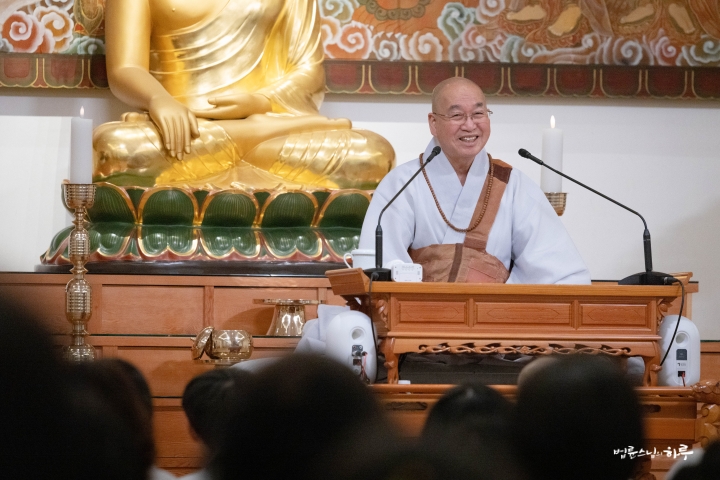
Jungto Society particularly emphasizes collaboration with international organizations. For instance, when building a school in Syria, we provided the funding and ideas, but the actual construction was carried out by the “White Helmets,” a civilian rescue organization. In Bhutan, we work directly with the government. The Bhutanese government operates the country based on the concept of GNH (Gross National Happiness) rather than GDP or GNP, which aligns with our values. Therefore, we continue to collaborate with the Bhutanese government.
In this way, Jungto Society has established these ten goals and strives to create a better world through individual practice, giving, and service. In Jungto Society, we call this “Mosaic Buddha.” While we may not be able to fully embody the character of the Buddha as individuals, each of us can resemble one piece of the Buddha’s character. If tens of thousands of people come together, each representing one piece of the Buddha, then even though individuals may be lacking, Jungto Society as a collective can accomplish remarkable things, as if the Buddha himself had appeared in the world. 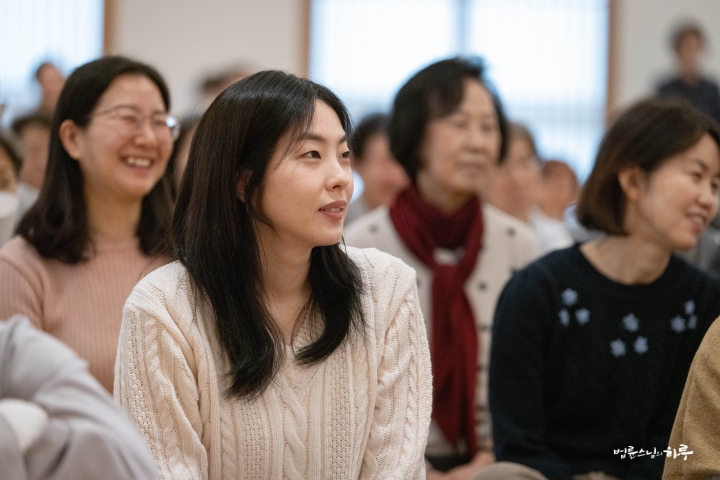
Let’s First Make a Daily Offering for Someone’s Survival Before Living Our Day
After completing this dedicated practice, we share our reflections with others – this is called heart sharing. Next comes dana (giving). The practice is “Making an offering of at least 1,000 won per day.” This amount was established 32 years ago, at a time when nearly a billion people worldwide were living on less than one dollar per day. With so many people unable to earn even 1,000 won daily, wouldn’t it weigh on our conscience to buy expensive perfume or eat meals costing tens of thousands of won? That’s why Sunim established the principle: “Let’s first make an offering for someone’s survival before spending on ourselves.” This isn’t about giving because we have excess money or sudden windfall. It’s about first setting aside one day’s survival cost for those struggling to survive in this world, and then living our own lives with what remains. After that, we can use the rest of our money to buy food we like or clothes we want. While this practice helps the poor, in a way, it also helps ourselves. It gives us permission to spend the rest of our money knowing we’ve contributed to someone’s survival today. That’s why Sunim encourages us to give at least one dollar a day. What matters most isn’t the amount but our mindset.
The final practice is service. Typically, we calculate and receive payment for our labor rather than simply doing good deeds. Instead, let’s perform at least one act of kindness daily without expecting anything in return. This might be giving up your bus seat to an elderly person or picking up litter from the street – intentionally doing good deeds that others might not do. When we deliberately practice these acts of kindness, they eventually become second nature. That’s why Sunim encourages us to do at least one good deed every day.
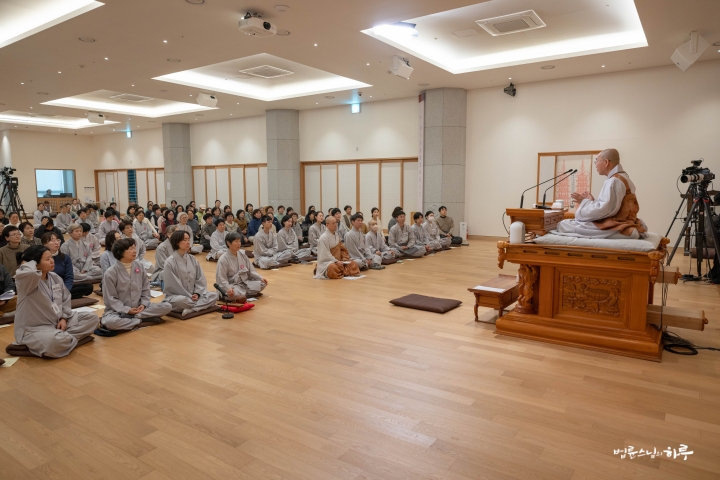
Jungto Society Operates Through Members’ Practice, Giving, and Service
Service is also a form of giving. When you work and receive compensation, it can essentially be considered a transaction of buying and selling. However, practitioners do not sell their sacred labor for money. The key issue isn’t whether practitioners should receive a salary or not. Rather, if you do something for profit, you are not a practitioner. A practitioner farms not to make money but to share and eat together. You must maintain the perspective that no labor is done for profit. Service means giving your time and talents. Jungto Society does not employ anyone, so it is maintained through your giving and service. Some people volunteer part-time, while others, like Dharma teachers, dedicate their full time to service. In other words, there are people who make service their vocation. Through these collective efforts, we are able to accomplish many things both domestically and internationally.
Jungto Society does not accept money from large corporations. We have never once received money from conglomerate companies. No one has offered it either. We also do not accept money from the government. Many social organizations receive government subsidies. Doing so, however, raises concerns about various regulations, interference, and supervision from the government. Therefore, we do not accept any money that might compromise Jungto Society’s integrity. We only accept support from those who share Jungto Society’s vision. As a result, we are extremely frugal. Ultimately, Jungto Society is maintained because you open your hearts and give even a little through donations and service. Despite our relatively small numbers, the reason Jungto Society can engage in meaningful activities in our society is thanks to your practice, giving, and service. Therefore, if our influence spreads a little more, our contribution to society will become much greater in the future.”
After the Dharma talk, the participants gathered in groups to share their thoughts. Following the Four Great Vows, the Open Dharma Assembly concluded after 12 noon.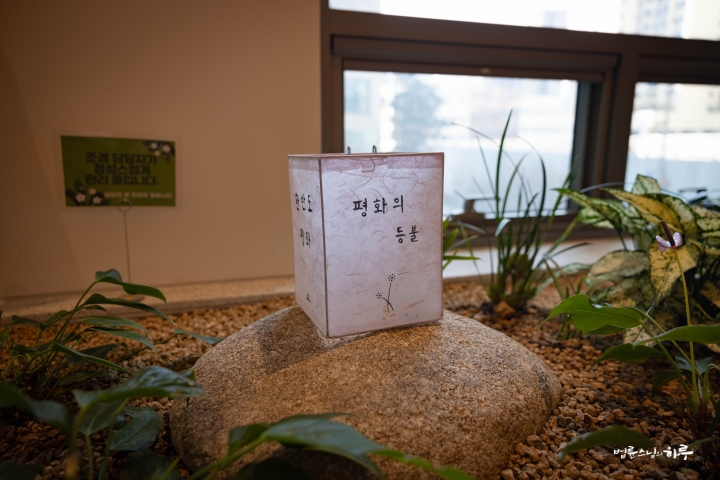
Sunim had lunch with the participants in the dining hall on the first basement level. After finishing the meal, at 2 PM, a representative from the National Heritage Administration visited to discuss cultural heritage preservation.
After the meeting, at 6 PM, Sunim recorded a congratulatory message in the 6th-floor studio for the 30th anniversary celebration of BTN (Buddhist Broadcasting Network), as requested.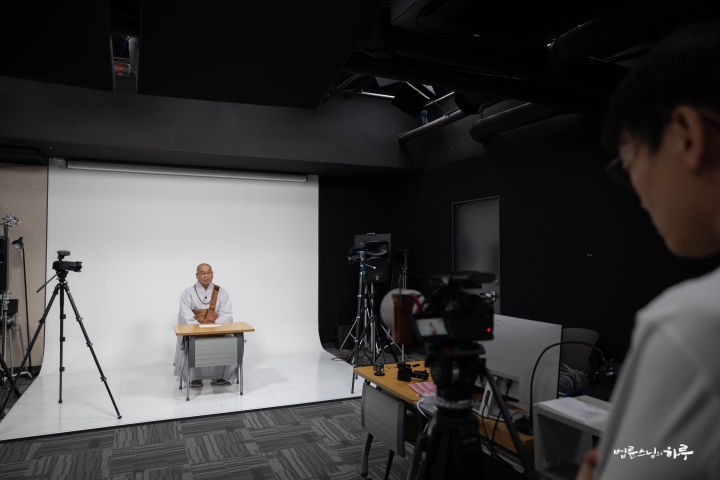
As the sun set, at 7:30 PM, Sunim began the 6th lecture of the Open Dharma Assembly for evening session members. About 100 participants who had rushed over after work filled the Dharma hall on the third floor.
The lecture topic for the evening session was Barugongyang (formal Buddhist monastic meal) and the Small Heart Sutra. Today was the third session, focusing on the explanation of Saengbange (生飯偈, Verse for Generating Food).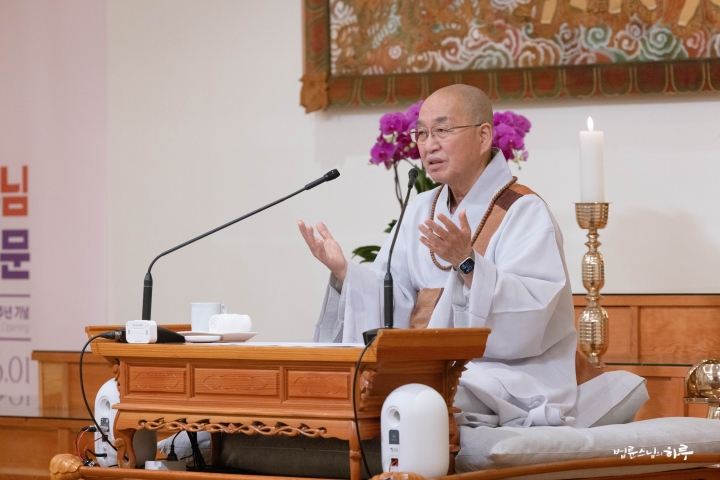
“Today is the third lecture on the Small Heart Sutra, and it’s time to discuss Saengbange. Saengban means to create food. The content most similar to this Saengbange in Christianity would be the story from Jesus’ Sermon on the Mount. It is said that about five thousand people gathered at that time. When lunchtime came, most of the people who had gathered were poor and hadn’t properly prepared food. A few had brought bread, or what we might call packed lunches, but most hadn’t prepared any food.
If We Share Just a Little, No One in This World Would Starve to Death
But having those who brought food eat while those who didn’t brought food go hungry doesn’t align with Jesus’ teachings. This is because Jesus taught, ‘To enter the kingdom of heaven, give water to the thirsty, food to the hungry, clothes to the naked, medicine to the sick, welcome strangers, and visit those in prison.’ He also preached, ‘What you have done for the least of these in this world, you have done for me. Those who do so will go to heaven on the day of final judgment, and those who do not will fall into the fiery pit of hell.’ So it wouldn’t be right for some to eat because they brought food while others go hungry because they didn’t.
So they gathered all the food. When collected, there were five loaves of bread and two fish, which in Chinese characters is written as 五餠二魚 (five loaves and two fish). This collected food was distributed to the people, and it is said that there were 5,000 people. Even with some exaggeration, the point is that everyone ate their fill from the gathered food, and some was even left over. We have a Korean saying that ‘Twelve people can share a single bean.’ This is exactly the spirit that Saengban refers to. It’s named for the idea that ‘food is generated.’ 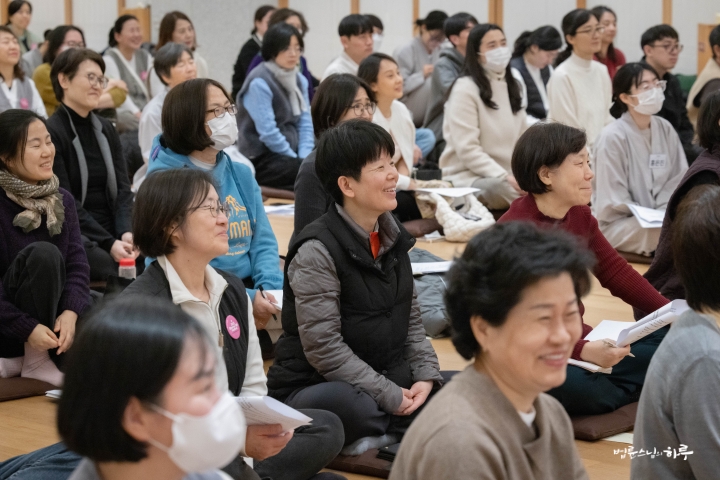
The food in my bowl is the minimum amount I need to eat to survive. There are many people in this world who face the risk of starvation because they cannot even eat this much. Therefore, I should at least share one spoonful of my rice with such people. This is called “food offering” (heonsik). Whether it’s a grain of rice or a spoonful, when we gather what we share, miracles happen. Simply put, if people today shared just a little, no one in this world would die of hunger.
Wasting One Spoonful of Rice Causes Someone on the Other Side of the World to Go Hungry
While food production shortages may be part of the problem, the more fundamental cause comes from unequal distribution. Twenty years ago, I saw statistics showing that the cost of food waste disposal in our country was already 400 billion won. That’s just the processing cost, not the value of the food itself, so the actual amount would be much higher. It’s estimated that the food we throw away amounts to more than 1 trillion won annually at minimum. That money could save all the people starving in North Korea and still have some left over. But that’s not the reality. First, we don’t help because we don’t know they’re starving, and second, we say we can’t give to “bad people.” Because of these issues, one side throws away excess food while the other side starves to death. In South Korea, people eat until they’re overweight and then make a fuss about dieting, while in North Korea, people are dying of malnutrition.
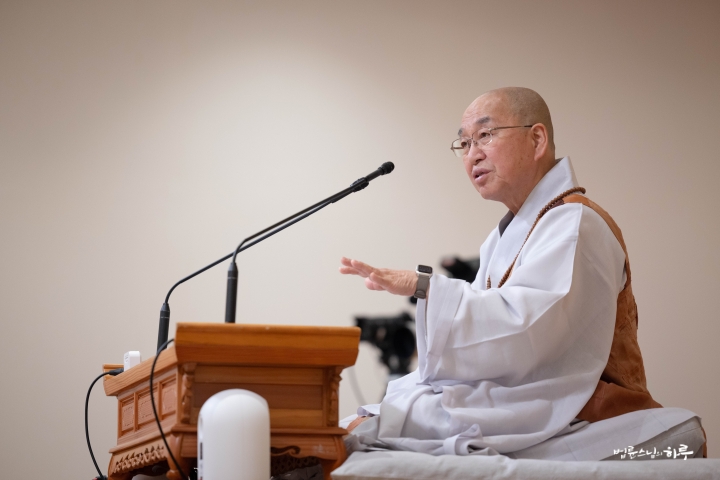
This imbalance is the world we currently live in. When we talk about this, it’s easy to think that only a few specific people are bad, but that’s not the case. This is a problem we all share. When we waste a spoonful of rice here, it directly affects someone going hungry on the opposite side of the earth. This is because everything is interconnected. Even without directly giving to someone, simply eating frugally and not wasting food is an act that can save a hungry person on the other side of the world. This is how the world is connected. Therefore, when we practice barugongyang (formal Buddhist meal with bowls), being economical and eating without waste means that food can reach those starving on the other side of the earth.
Our country has a lot of money, so when there’s a food shortage, we can import more as citizens consume more. This causes international food prices to rise. As a result, poorer countries can import less food with the same amount of money. This is precisely how the problem of hunger among the poorer population occurs. Even we might face situations where we have nothing to eat immediately after disasters like typhoons or earthquakes. This act of sharing the food we have is called “saengban.” Let’s examine the Saengbange (verse for offering food).
Yeodeung Gwisinjoong Ageum Siyeogong Chasik Byeonsibbang Ilche Gwisingong
汝等鬼神衆 我今施汝供 此食邊十方 一切鬼神供
“Yeodeung Gwisinjoong” (汝等鬼神衆) means “you hosts of spirits.” Here, “hosts of spirits” doesn’t refer to formless ghosts but to those who are hungry.
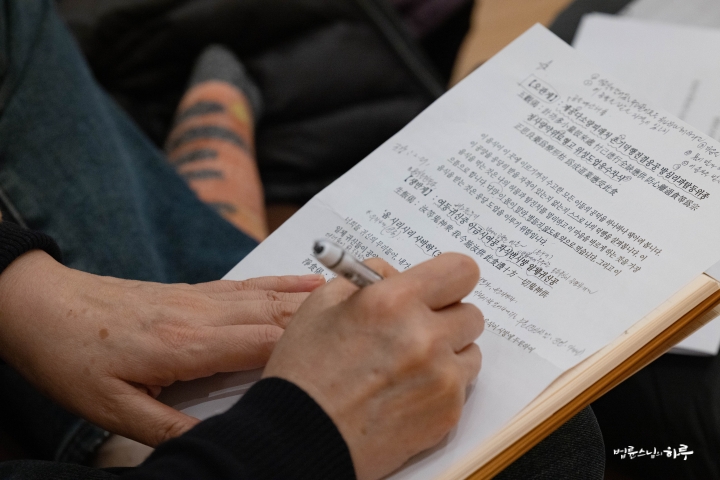
Ageumsiyeogong” (我今施汝供) means “I now offer this food to you,” and “Chasikbyeonsibbang ilchegwisingong” (此食邊十方 一切鬼神供) means “With this food, I make offerings to all hungry spirits throughout the dharma realm.” In simple terms, it means offering this food equally to all hungry beings in the world. It’s about having the mindset of sharing food with hungry people every time we eat. Moreover, it’s about committing to practice this not only during meals but in our daily lives as well. Practicing in daily life means saving a little regularly and using the saved money for charity. For example, buying two sets of clothes instead of three in a year, or one pair of shoes instead of two, and using the saved money for donations. Building schools in villages without them so children can learn properly, digging wells in places without water so thirsty people can drink, sending food to areas with shortages so hungry people can eat, providing clothes to those without, or building homes for the homeless—this is the true spirit of Barugongyang (formal Buddhist monastic meal).
Why Not Even a Speck of Red Pepper Powder Should Be Wasted
After the meal is finished, we wash the bowls with clean water, collecting the water from the last bowl to the first. The water collected from the last bowl should be as clear as when it was first poured from the pitcher. We recite the Water Offering Verse over this clean water. This water used to wash the bowls should not contain any food particles or have a yellowish color. However, when beginners join, the water often contains residue and appears cloudy. This indicates that the bowls are not properly cleaned. Clean water after washing the bowls signifies that the bowls themselves are clean.

Why is the cleanliness of this water emphasized so much? In the six realms of samsara, the hell realm is at the bottom, and above it is the realm of hungry ghosts. Hungry ghosts live in this realm. These beings have stomachs as large as mountains but throats as narrow as needles, which is why they are always hungry. With such narrow throats, it’s nearly impossible for enough food to enter and fill their enormous stomachs. This symbolizes their constant state of starvation. If food particles get stuck in these needle-thin throats, they become lodged and turn into fire, causing the ghosts to suffer from burning throats.
In the story of Venerable Maudgalyayana, he saw his mother in hell and rescued her to the realm of hungry ghosts, where he offered her food. When she received the food, other hungry beings rushed toward her. She kicked them away, wanting to eat alone, and quickly stuffed the food into her mouth. The story tells us that as a result, her throat caught fire. It is said that there is something like sweet dew that can slide down the throat without getting stuck—this is the clean water from the monks’ Barugongyang. When hungry ghosts drink this water, they can eat their fill.
What is the message behind these stories? It’s about not wasting food carelessly. Wasting food is equivalent to causing hunger for people on the other side of the world. In ancient times, this interdependence was expressed in this way. First, not even a speck of red pepper powder should be wasted, and second, the bowls must be kept immaculately clean. This emphasizes the importance of conserving food and maintaining cleanliness.” 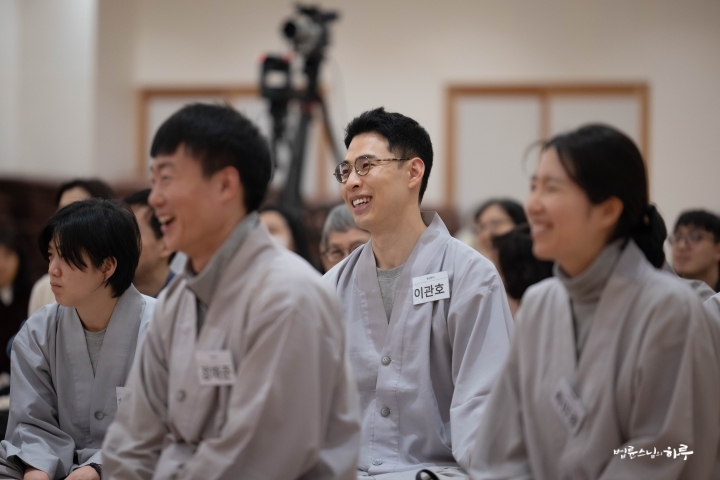
Sunim finished explaining the Jeongshikge (formal meal verse), Samshikge (three meal verse), Jeolsuge (water conservation verse), and Haetaljuga (liberation verse) recited at the end of Barugongyang (formal Buddhist monastic meal). Finally, everyone chanted the Heart Sutra from beginning to end.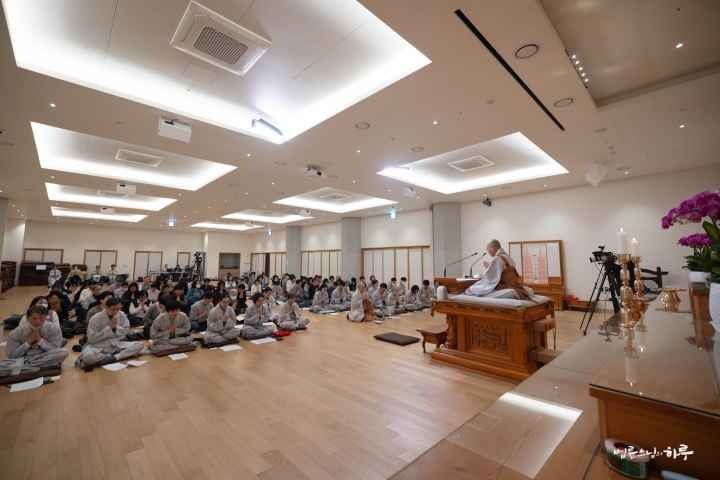
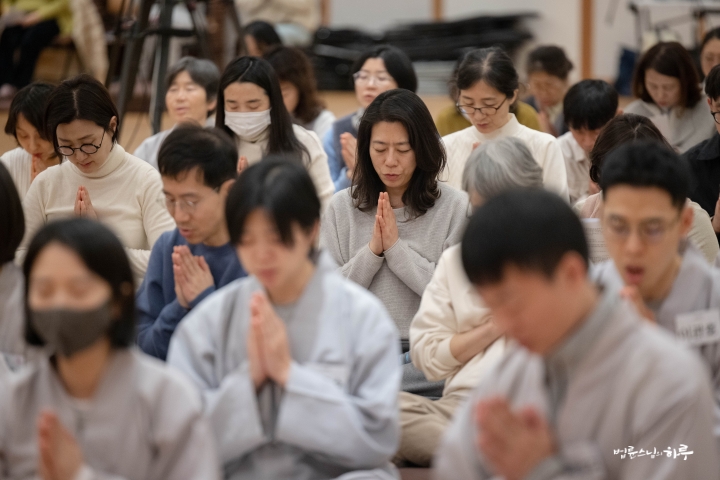
Today concluded the lectures on the Small Heart Sutra. Next week, the lectures will continue with the “Dharmadhatu Gatha,” which contains the essential points of the Avatamsaka Sutra.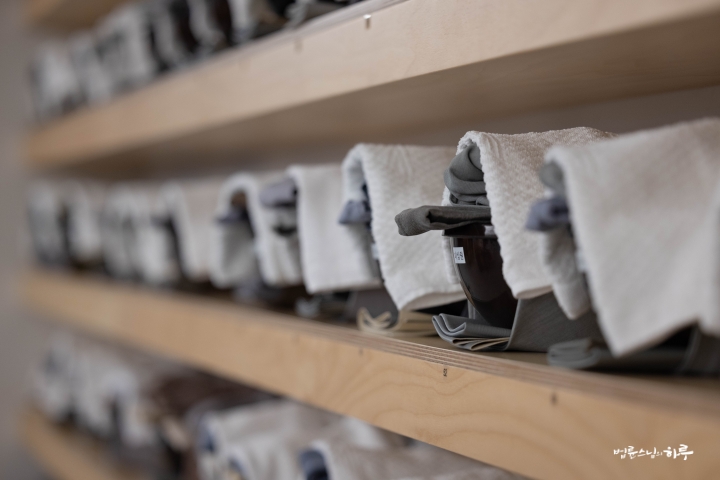
After the Dharma talk ended, the participants gathered in groups to share their thoughts, while Sunim left the Dharma hall and headed to the Jungto Center.
Tomorrow will be the 12th day of the 100-Day Dharma Talk. In the morning, Sunim will participate online in the US Jungto Society board meeting, followed by the morning session of Friday Dharma Q&A at the Jungto Social and Cultural Center. In the afternoon, he will have consecutive meetings with social leaders visiting the Peace Foundation, and in the evening, he will conduct the evening session of Friday Dharma Q&A.




